Concrete batching plants in Africa are fast gaining popularity as evidenced by the increase in the use of ready-mix concrete supplied to construction sites. The need to control costs, increase delivery times as well as the need for consistency of each concrete batch are just some of the needs that have driven demand. The growth in the concrete batching plant market has been driven primarily by large infrastructural projects but in addition to this there is a growing use of medium sized batching plants in building projects as the need for housing has taken center-stage in Africa.In Africa, controlling concrete delivery can be especially difficult. Construction sites are more likely to be in remote areas, and warm climates can mean an extra strain on delivery times.Batching plants can today be seen dotting virtually all large infrastructure projects but in addition to this are businesses that have been setup around exclusively providing ready-mix concrete to meet the demand from a growing number of office block and housing projects in urban areas. Contractors have come to the realization that costs can be reduced by outsourcing this function and simply ordering ready-mix concrete rather than going the more traditional labor intensive way of concrete production on site.
According to Mustam Industry, the potential for concrete batching plants in Africa has given rise to the introduction of new technologies in the market which look to improve the concrete production process plus the quality of the concrete itself.
Mustam is among the leading machinery manufacturers in Ankara/TURKEY, with years experiences on construction machinery part of; Stationary Concrete Batching Plants, Mobile Concrete Batching Plants, Compact Concrete Batching Plants, Mini Concrete Batching Plants, Concrete Mixers among others.
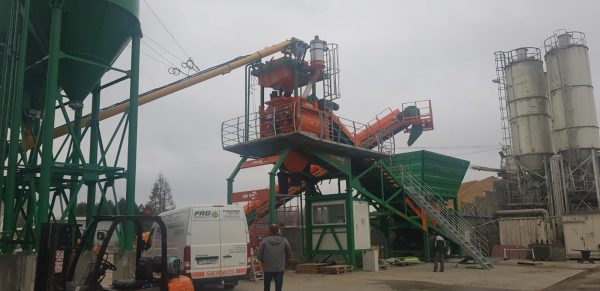
This shift towards outsourcing has been driven by several advantages that are not easy to ignore especially as profit margins in development projects have become leaner. According to Ahmet Nizam of Umman in Turkey, the best option is to use mobile concrete batching plants. Erecting a mobile batching plant near the construction site will provide the opportunity to get the desired concrete at desired amount,quality and time.
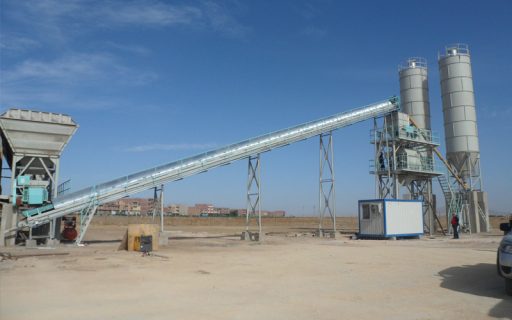 When Construction Review talked to Solomon Mungai a director of Rhombus Concrete Ltd a Kenyan supplier of ready-mix concrete it was evident that the construction industry is trending towards the use of batching plants to supply ready-mix concrete to sites as greater awareness of the benefits becomes more appreciated.
When Construction Review talked to Solomon Mungai a director of Rhombus Concrete Ltd a Kenyan supplier of ready-mix concrete it was evident that the construction industry is trending towards the use of batching plants to supply ready-mix concrete to sites as greater awareness of the benefits becomes more appreciated.
Also Read: Installing a concrete batching plant in Africa
Consistency
One of the reasons that we constantly read about buildings collapsing while under construction is due to poor concrete mixes. This is all too prevalent when you consider the number of reported collapses of projects in the daily papers. One of the main culprits has been failure to allow the concrete enough time to cure, human error on the part of the contractor mixing the concrete on site to the more devious practice of cutting back on the required quantities in the mix by an unscrupulous contractor. For the developer it means costly remedial action and even prosecution in court for negligence especially if there is injury or fatalities involved.
Moreover, as Nikolay from PMS Machinery in Turkey mentions, technological advancements have seen modern plants having internet connections whereby calibrations can be done online; also human interface automation which makes it easy for the operator to control the plant and ensure quality concrete production.
“The automation systems go as far as, power panel and switches, batching control terminals, automatic control unit, software, control panel, computer, screen and plotter and PLC panels,” Emre Cilplak from Constmach in Turkey affirms.
Land
As the value of land grows so has the final cost of a development project and in order to remain viable it has meant that a developer needs to utilize every square inch of land on a project efficiently. This has meant that there is no luxury to provide space on site for trucking in sand, aggregate and stocking cement for laborers to mix concrete. The more attractive alternative has become ordering concrete which is delivered to the site on mobile concrete mixers that drive in, and pump the concrete into the required location an activity that is competed in a matter of hours so that sites can remain relatively clutter free.
Pilferage
In a traditional site, pilferage is always a reality. Theft of cement, delivery of less supplies of sand and aggregate by unscrupulous truckers occurs more often that is realized.
To provide a more reliable concrete mix the use of supplies provided by a batching plant means greater consistency in the mix throughout at a predetermined fixed cost. It also helps do away with pilferage that is all too rampant when you have cement bags stored on site.
Wastage
“There is virtually no wastage when it comes to the supply of read mix concrete”. Stressed Mr Mwangi the Business Development Manager for Rhombus whom we also spoke to.
Mixing concrete on site results in a high level of wastage of material where it is as a result of torn bags of cement or aggregate and sand spilt haphazardly during delivery. This is something that is the bane of any developer who has to foot the cost of such wastage. Concrete produced in a batching plant ensures no wastage and the client only pays for what he ordered.
Meeting exact specification
Testing of the concrete at the batching plant ensures that what is delivered to site is of consistent quality and according to specifications whether it involves concrete with a faster curing time or waterproofing characteristics. Any requirement can be met reliably and consistently for the contractor to ensure that the project is not affected negatively by poor concrete mixes.
Pollution
Concrete batching plants that supply ready-mix concrete to sites have meant that there is less pollution of the environment with respect to noise produced by rumbling concrete mixers and the sites are relatively neater having eliminated bags of cement and heaps of sand and aggregate lying around the site.
Selecting a batching plant
The right batching plant can have a major impact in the overall success of a project. Therefore, before choosing a particular batching plant, Jennifer from Concrete Batching Systems in the UK advises that, the contractor should be aware of the output of the machine and if it is in line with what they want to produce.
“Moreover, price should not be the most important thing. Quality of the mix should always come first,” adds Mr. Claus Hansen of Skako in Denmark.
Service life is important while selecting a concrete batching plant. According to Fabo, if a concrete batching plant will be used for a short time, the dry type concrete batching plant should be preferred because it is cheaper. If it will be used for a long time, the classic type concrete batching plant should be preferred. If it will work in one place, the stationary type should be used. If it will be used in more than one construction site, the mobile concrete batching plant should be preferred.
“As a company exporting to 44 countries all over the world, we attach importance to quality and customer satisfaction. We support our customers throughout service life, not until delivery. We have brought many innovations to our customers. One of these is the Minimix Mobile Concrete Batching Plant, which is transported in a single container and thus reduces the cost of shipment,” said Fabo.
Setting up a batching plant
Installing a batching plant requires various activities to take part. This include having a main plant structure, concrete mixer, cement silos screw conveyor, belt conveyor, weighing system, dust removing system, and a control room.
Having a main plant entails construction of a batching plant foundation whereby the installation of the concrete batch plant is assembled in line with the drawing requirements as per the clients request and the construction works cooperate with each other in the installation process.
The concrete mixer installation takes into consideration of ancillary projects like power, water rainproof measures and transport corridors of the materials sites to meet the mix requirements to reduce later alteration. Cement silo, through a crane then is hoisted vertically to the foot of the silo foundation to put it in place after which the crane is gradually loosened until it reaches the flat surface of the embedded part.
Installation of screw conveyor follows suit whereby the entrance part of the screw conveyor nears the end of the monitor, fixing the conveyor preliminary according to the import and export position to keep the interface tube in a vertical position.
Nevertheless, according to Egor Solovev of Scandinavian & UK Machines from Sweden, it is paramount that you have a professional on-site to ensure that everything is in good place to avoid down-time during the project.
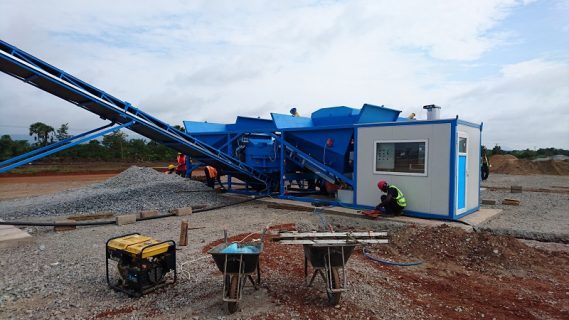
Therefore, Richard Isaacson of Iwi Group from the US recapitulates that, with the increase in construction projects in Africa, the need for batching plants is set to rise; hence, consumers should be very keen before purchasing a batching plant or better yet, consult a professional to give assessments.
Moreover, when it comes to used plants, over new to concrete equipment, one of the greatest benefits of buying used concrete equipment is the affordability. You do not have to sacrifice quality in order to get an affordable piece of equipment.
With this in mind,buying high-quality used equipment is typically a better option than purchasing new equipment that is of a lower quality. In the end, you may find that this equipment malfunctions or does not last long, which can cost you more money in the end than if you had just purchased re-manufactured equipment from a dependable manufacturer.
Contact our contributors
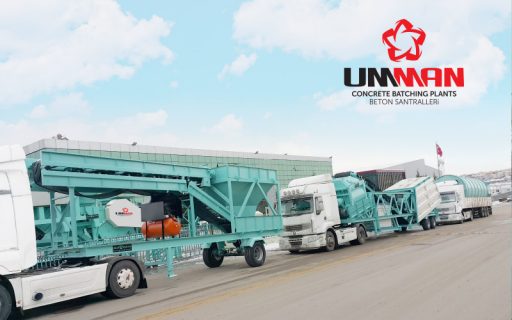
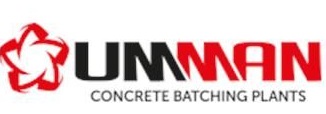 Turkey
Turkey
Kenya
PMS Machinery
Turkey
Turkey
Turkey
Sweden
USA
Denmark
UK


Turkey concrete batching plants enable concrete to be manufactured economically.
Good, any time you want batching plant operator please contact me
On [email protected] or +250789682586